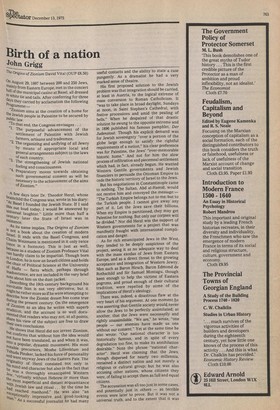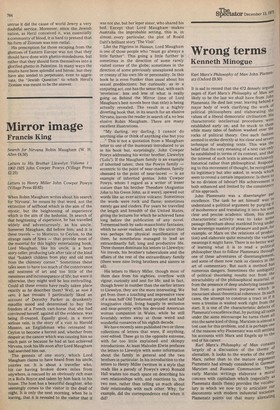Birth of a nation
John Grigg
The Origins of Zionism David Vital (OUP £8.50) On August 29, 1897 between 200 and 250 Jews, Mainly from Eastern Europe, met in the concert hall of the municipal casino at Basel, all dressed in white tie and tails. After conferring for three days they carried by acclamation the following Programme:—
"Zionism aims at the creation of a home for the Jewish people in Palestine to be secured by public law. To that end, the Congress envisages .. 1. The purposeful advancement of the settlement of Palestine with Jewish farmers, artisans and tradesmen. 2. The organizing and unifying of all Jewry by means of appropriate local and general arrangements subject to the laws " of each country. 3. The strengthening of Jewish national feeling and consciousness. 4. Preparatory moves towards obtaining such governmental consent as will be necessary to the achievement of the aims of Zionism."
few days later Dr. Theodor Herzl, whose '
orainchild the Congress was, wrote in his diary: At Basel I founded the Jewish State. If I said this out loud today, I would be answered by universal laughter." Little more than half a century later the State of Israel was in existence.
. As its name implies, The Origins of Zionism Is not a book about the creation of modern csrael. It ends with the Basel Congress, and halm Weizmann is mentioned in it only twice (once in a footnote). This is just as well, because as a student of Zionism Professor Vital .ean hardly claim to be impartial. Though born !ri London, he is now an Israeli citizen and holds the chair of Political Science at the University !If Haifa — facts which, perhaps through Inadvertence, are not included in the very brief note about him on the dust-jacket.
. Describing the 19th-century background his Inevitable bias is not very obtrusive, but it
Ight be rather more so if he were attempting to °!esoribe how the Zionist dream has come true Miring the present century. On the emergence (31. Zionism as an idea he writes with superb erudition, and the account is so well docu ented that readers who may not, at all points, t'Lrlare his view of the subject are free to draw neir own conclusions.
He shows that Herzl did not invent Zionism, out confirms that without him the idea would nto
not have been translated, as and when it was, :I a Popular, dynamic movement. His most yotable precursors, Moshe Lilienblum and a„e!luda Pinsker, lacked his force of personality were anyway Jews of the Eastern Pale. The ginality of Herzl consisted not only in he mind and character but also in the fact that Was a thoroughly emancipated Western virtually without Hebrew or more than Most superficial and distant acquaintance h1 Jewish law and ritual ... by the time he __ad reached manhood." He was also "an 7.nxcePtionally impressive and good-looking all" As a successful journalist he had many
useful contacts and the ability to state a case pungently. As a dramatist he had a very marked sense of theatre.
His first proposed solution to the Jewish problem was that integration should be carried, at least in Austria, to the logical extreme of mass conversion to Roman Catholicism. It "was to take place in broad daylight, Sundays at noon, in Saint Stephen's Cathedral, with festive processions and amid the pealing of bells." When he despaired of that drastic solution he swung to the opposite extreme and
in 1896 published his famous pamphlet, Der Judenstaat. Though his explicit demand was for Jewish sovereignty "over a portion of the
globe large enough to satisfy the rightful requirements of a nation," his clear preference was for Palestine, the Jews' "ever-memorable historic home." And not for him the slow process of infiltration and piecemeal settlement which had, in fact, already begun. He wanted Western Gentile governments and Jewish financiers to persuade the Ottoman Empire to cede the historic territory of Israel to the Jews.
But his negotiations in Constantinople came to nothing. The Sultan, Abd al-Harnid, would not receive him and conveyed the message: — "The Turkish Empire belongs not to me, but to the Turkish people. I cannot give away any part of it. Let the Jews save their billions. When my Empire is partitioned, they may get Palestine for nothing. But only our corpses will be divided." Nor did Herzl win the support of Western governments for a project that was manifestly fraught with international complication and danger.
As for rich emancipated Jews in the West, they tended to be deeply suspicious of the project, seeing it as no adequate way to deal with the mass exodus of Jews from Eastern Europe, and as a direct threat to the growing acceptance and integration of Western Jewry. Men such as Baron Hirsch, Baron Edmond de Rothschild and Sir Samuel Montagu, though keen enough to help the victims of Eastern pogroms, and proud enough of their cultural tradition, were repelled by some of the implications of Herzl's ideology. There was, indeed, a disastrous flaw at the very heart of his argument. At one moment he was asserting that Gentile society would never allow the Jews to be perfectly assimilated; at another, that the Jews were necessarily and rightly unassimilable. "We are," he wrote, "one people — our enemies have made us one without our consent." Yet at the same time he also wrote: "Our national character is too historically famous, and in spite of every degradation too fine, to make its annihilation desirable." Note the phrase "national character". Herz] was claiming that the Jews, though dispersed for nearly two millennia, remained a distinct nation and not merely a religious or cultural group; but he was also accusing other nations, whose citizens they were, of failing to accept them as full and equal citizens.
The accusation was all too just in some cases, and potentially just in others — as terrible events were later to prove. But it was not a universal truth, and to the extent that it was untrue it did the cause of world Jewry a very doubtful service. Moreover, since the Jewish nation, as Herzl conceived it, was essentially a community of blood, it is hard to pretend that his form of Zionism was non-racial.
His prescription for those escaping from the ghettoes of Eastern Europe was not that they should have done with ghetto-mindedness, but rather that they should form themselves into a glorified ghetto in Palestine. In many ways the results have been splendid and heroic, but they have also tended to perpetuate, even to aggravate, the "Jewish Question" to which Herzl's Zionism was meant to be the answer.


































 Previous page
Previous page